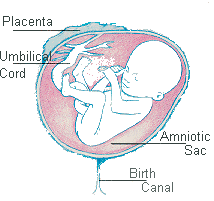First Trimester
Checklist:
- Schedule your first prenatal
visit with your practitioner when you're about nine weeks' along. Plan on seeing
your practitioner every four weeks.
- Avoid alcohol, drugs and
cigarettes.
- If your immunizations are not
up to date,
let your practitioner know.
- Drink lots of fluids,
especially water (8 to 10 glasses a day).
- Stick to a diet naturally
high in folic acid (oranges, melons and dark green vegetables).
- Eat plenty of iron-rich foods
(whole grains, beans, raisins and nuts).
-Keep your blood sugar level
elevated by eating lots of high-protein and high-carbohydrate foods such as
breads, brown rice, potatoes and cheese.
- As a general rule, avoid
medication and consult with your doctor before taking any.
- Get plenty of sleep, and try
to nap if you feel tired during the day.
- Exercise,
but moderately. Don't start a new exercise regimen when you're pregnant, and be
careful not to become overheated for prolonged periods.
- If you're a coffee drinker,
cut back, switch to decaf or try herbal or decaffeinated tea.
- If your family has a history of genetic disorders, consider prenatal testing.
- Choose a place to give birth
(hospital? birthing center? home?).
- Consider starting a pregnancy
diary and having someone take a picture of you (and your expanding belly) each
month.
- Refrain from getting perms,
dyes and other hair treatments involving heavy chemicals.
First
Month:
Your Baby
For the first 8 weeks, your developing baby is
called an "embryo."
Tiny limb buds, which will grow into arms and legs, appear.
Embryo looks like a tadpole.
Heart and lungs beginning to form. By the 25th day, heart starts to beat.
Neural tube, which becomes the brain and spinal cord, begins to form.
At end of first month, embryo is about 1/2 inch long and weighs less than 1
ounce.
Your Body
You become pregnant and miss your period.
Your body is making hormones needed to "grow" a baby. Your breasts are
slightly bigger and sore.
If you have morning sickness, try eating crackers.
You may have cravings, or hate foods you usually like.
You will urinate more often because your growing uterus is pressing on your
bladder.
Prenatal Care Guide
Before you get pregnant, supplement your diet
with B vitamin folic acid (found in most multivitamins) to reduce the risk of
birth defects of the brain and spine.
Visit your health care provider for your first prenatal care checkup as soon as
you think you are pregnant.
During the first 8 weeks of pregnancy, all of your baby's organs are forming and
can be damaged if you smoke, drink alcohol or take drugs.
Ask your health care provider before taking any prescription drugs or
over-the-counter products.
Stop smoking and drinking alcohol. Stop doing street drugs.
Second Month:
Your Baby
All major body organs and systems are formed
but not completely developed.
Early stages of placenta, which exchanges nutrients from your body for waste
products produced by the baby, are visible and working.
Ears, ankles and wrists are formed. Eyelids form and grow but are sealed shut.
Fingers and toes are developed.
By end of second month, fetus looks more like a person than a tadpole, is about
1 inch long and still weighs less than 1 ounce.
Your Body
Your breasts are still sore; your nipples and
the area around them begin to darken.
Morning sickness may continue.
You may feel tired and need to rest more as your body adjusts to being pregnant.
The total amount of blood in your body increases.
Prenatal Care Guide
Visit your health care provider for one
prenatal care checkup.
Eat a variety of healthy foods from the five major food groups: cereals and
grains; fruits; vegetables; dairy products; and meats and beans.
Continue to supplement your diet with folic acid during your second and third
months of pregnancy to reduce the risk of certain birth defects.
Drink at least 6 to 8 glasses of water, juice and/or milk every day.
Don't cut down on salt unless your doctor says so.
Third Month:
Your Baby
After 8 weeks as embryo, baby now is called a
"fetus."
Fingers and toes have soft nails.
Mouth has 20 buds that will become "baby teeth."
You can hear your baby's heartbeat for the first time (10 to 12 weeks) using a
special instrument called a "doptone."
For the rest of pregnancy, all body organs will mature and fetus will gain
weight.
By the end of this month, the fetus is 4 inches long and weighs a little over 1
ounce.
Your Body
You may still feel tired and have morning
sickness.
You may have headaches.
You may get lightheaded or dizzy.
Your clothes may begin to feel tight around your waist and breasts. Try pullover
tops and skirts/pants with elastic waists.
Prenatal Care Guide
Visit your doctor or health care provider for
one prenatal care checkup.
You have a slightly increased need for almost all vitamins and minerals to
nourish Your Baby. A healthy diet meets most of these needs.
You may have gained 3 or 4 pounds by now. A woman who starts pregnancy at a
normal weight should gain 25 to 35 pounds. Ask your health care provider how
much weight you should gain.
Exercise can be fun and good for both of you. Walking is a good choice.
If your health care provider recommends prenatal testing using chorionic villus
sampling (CVS), it will be done now.

By the end of the 3rd month, the fetus is 4
inches long and weighs a little over 1 ounce.
Back

